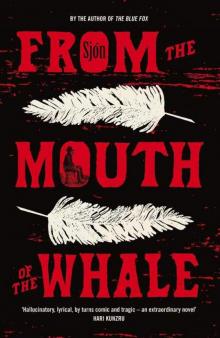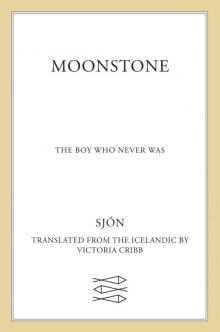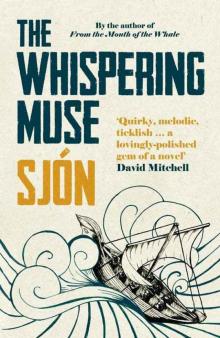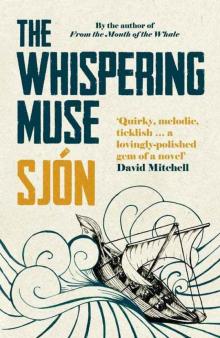The Blue Fox Read online
SJÓN
THE BLUE FOX
TELEGRAM
First published in Icelandic as Skugga-Baldur by Bjartur, Reykjavik, 2004
First English print edition published by Telegram, 2008
This eBook edition published 2011
eISBN: 978-1-84659-106-8
Copyright © Sjón
Translation copyright © Victoria Cribb
TELEGRAM BOOKS
26 Westbourne Grove
London W2 5RH
www.telegrambooks.com
All rights reserved. No part of this book may be reproduced or transmitted in any form or by any means, electronic or mechanical, including photocopying, recording or by any information storage and retrieval system, without permission in writing from the publisher.
(9–11 January 1883)
Blue foxes are so curiously like stones that it is a matter for wonder. When they lie beside them in winter there is no hope of telling them apart from the rocks themselves; indeed, they’re far trickier than white foxes, which always cast a shadow or look yellow against the snow.
A blue vixen lies tight against her stone, letting the snow drift over her on the windward side. She turns her rump to the weather, curls up and pokes her snout under her thigh, lowering her eyelids till there’s the merest hint of a pupil. And so she keeps an eye on the man who has not shifted since he took cover under the overhanging drift, here on the upper slopes of Asheimar, some eighteen hours ago. The snow has drifted and fallen over him until he resembles nothing so much as a hump of ruined wall.
The creature must take care not to forget that the man is a hunter.
He began his pursuit away south at Botn. The sky was clear and the first blush of day at its winter blackest. The man slid down over the homefields, then set a course north over the Asar to Litla-Bjarg, where it had not drifted as yet.
Once there, he caught a movement on the brow of the hill. Thrusting a hand inside his clothes he took out a spyglass, extended it and put it to his good eye:
Yes, there was no mistaking it!
There was a daughter of Reynard on the move.
She seemed blithely unaware of any danger. All her movements indicated that she was on the prowl for a bite to eat. She went about her business unhurriedly, intent on this sole purpose.
The man took a closer look at her.
He bent his thought hard upon her, trying to get an inkling of what she intended, of which way she would go when she had finished her nosing on the crest. All of a sudden she took off at a run; the man couldn’t imagine why. Her whole demeanour showed that she sensed a grave threat. Yet she couldn’t have had the least suspicion of the man – by ordinary means.
She must have had a foreboding of his intention:
He’s a man with hunting on his mind.
The man walked up the hill. He tried to keep the image of the vixen clear in his mind to help him find her again the more easily: ‘She spins over the hard-packed snow like a top.’
Up on the crest he cast around for the vixen’s tracks. He pinched one fox print between thumb and forefinger; it seemed a sizeable beast. In the snowflake that lingered on his fingertip lay a gleaming hair – there was no mistaking the colour: blue.
Vertical streaks of cloud in the west.
Maybe a storm on the way.
The vixen nowhere to be seen.
The trail was plain, as far as the eye could see.
The man walked briskly with the wind at his back. It didn’t much matter now if the vixen caught his scent; she knew he was after her.
He paused every now and then to cast around, using the same method as before. He bent all his thought on the one goal of working out which way the vixen would run and where he would get within striking distance.
All at once he receives word of which way she is going and where he will get within striking distance:
‘The vixen is going north over the plain. She’ll double sharply to the east with the gravel beds of Melar before her, nothing but stones; a perfect hiding place for a blue fox.’
Was she too intent to take care? Had she given all her mind over to the danger – thereby letting him into her thoughts? Had she paid no heed to warding him off?
Had the man received a thought-message from the vixen?
Out on the stony plain the air was still and freezing hard; only the lightest breath touched his cheek. The man saw a bluish bump far to the north. He held himself still. After a while the bump began to stir. And shortly afterwards a blue vixen rose from the stones.
‘Ha, there she is!’
A rare beast. Dark as earth to look at, with a thick pelt and bushy tail, clearly jumpy as hell. She sprang away in sharp, stiff bounds.
The man set off at a run.
As he had suspected, the vixen made straight for the blowing snow. In the very instant before the blizzard swallowed her, she stopped short and glanced back at the man.
Then whisked away again at a terrific pace.
There was a whining in the air.
A ptarmigan hurtled past, a hair’s breadth from the man, driven before the wind. It was followed by a falcon, flying high with sure and steady wing-beats.
The man turned away from the blast, tightened his scarf and wrapped the shoulder strap three times round his right arm so the bag rested tight against his hip.
He was not too late for the storm.
The man trudged through the impenetrable murk.
At first he had stony ground underfoot and the going was not too bad, but the snow soon thickened; conditions deteriorated.
He had to trust to his line of thought:
‘The vixen can be childishly weather-shy. She’ll dig herself into a drift or press herself deep into crannies, well below the frost-mark, and there she’ll stay until the foul weather has passed.’
Now the man has a chance of lessening the gap between himself and the little fox.
He inched forward.
But just as the man felt he must have gained on the vixen, the snow suddenly deepened. It now came up to his crotch – and with the next step the man sat fast in his tracks.
He could go neither back nor forward; he couldn’t see the hand in front of his face.
The blizzard buffeted him from every side, from above and below.
As evening drew on, the weather turned wilder, the frost piercing his clothes in spite of their thickness, and he grew so cold that he had to shiver himself to warmth.
The man decided to let himself be snowed in.
He moved a little while this was happening, so the snow formed a windproof shell around him.
He was of medium stature, stout and bulky about the chest. His features were coarse; his forehead of middling height but broad, giving his face its character. He had small, steel-blue eyes, set deep under heavy brows that met in the middle, and a high-bridged, thick nose. The set of his profile and chin could not be made out for the dark-red beard, shot through with silver, which overlaid cheek and jaw, reaching down to his breast. He had grizzled, earth-brown hair. A domed birthmark perched high on his left nostril.
Such was the man in the snowdrift.
The night was cold and of the longer variety.
The man broke off his ice-shell.
He praised the Snow Queen and Jack Frost for the shelter they had given him on this fair patch of ground; from this vantage point he could see far and wide over the white frozen wastes.
He now took to pinching and squeezing himself. When he had finished rubbing warmth into the muscles of his upper-arms, he pulled on his gloves, braced his hands on the snow-ledge and hoisted himself off his throne.
Yes, he was a lucky dog.
Having shouldered his rifle and bag, the man didn’t slow his pace until he reached the smooth rocks of Lofaklo
pp, those ice-age remnants high up the mountain, where the snow never lies.
There he took off his haversack and removed his gloves, skin-shoes and knitted stockings, laying them to dry on the rock beside him.
No, damn it, he took off every stitch and sat there as he was created: in nothing but his skin.
He was the child of Earth Sun’s-daughter.
His guts rumbled and the man discovered that he was hungry; he hadn’t tasted a bite since gorging himself on boiled fish before he set off, but that was more than twenty hours ago.
He had eaten a bit of ice since then, truth be told, but that was dull and insubstantial fare. He opened the bag:
Hand-thick slabs of lamb, rye cakes with sheep’s butter, sour as gall, topped with mutton sausage, a dried cod’s head, pickled blood-pudding, dried fish, curd porridge and a lump of brown sugar.
Yes, all this was in his mess-bag.
The sun warms the man’s white body, and the snow, melting with a diffident creaking, passes for birdsong.
At noon the peaks were still bright and there were patches of blue in the sky. The man recalled the untold glorious hours he had spent in the mountains since he was a lad. Nothing could equal the beauty of those days – except the new chandelier in the church at Dalbotn.
No! The man flings himself flat on the ground: what did he glimpse there? Was it a boulder?
He grabbed the spyglass but could see nothing. Mist on the lens. He wiped it off with his sleeve. What? Could it be what he thought it was? It vanished, no, there it came back into view:
A fox’s head! Yes, the merest shadow of a head. It was the blue. Of course, she must have been on watch there for some time. He closed the spyglass.
The vixen gave a bloodcurdling screech.
The land thereabouts is featureless and slopes to the east, with low tussocks and shallow gullies. There was no way for the man to intercept the vixen without being seen. So he lay still where he had thrown himself when he spotted her. The vixen sprang on to a rock and began to howl. There she sat, pointing her muzzle at the sky every time she uttered a sound.
And so the vixen tried to provoke the man to move. She had probably lost him when he flung himself down.
The man lay flat on his stomach. He had managed to twist himself to face north, with his rifle before him, but didn’t dare move because there was no rise in the ground between him and the vixen, nothing to hide him from her view. Moreover, his weapon was not loaded. He couldn’t prime it without alerting the little fox.
He had to think fast if he weren’t to lose the vixen like the day before – that would be unthinkable.
What was he to do?
The vixen spun round on the rock and poised, ready to vanish. The man rolled over on to his back, waggling arms and legs in the air.
Then he did an about-turn and got on all fours, raising his right leg like a dog pissing on a tussock.
He bleated loudly.
With antics like these the man managed to delay the vixen’s departure. He crept into hiding and took thought while she waited for more wonders to appear.
The man loaded his rifle, ramming down half a measure of powder, which would be needed if he were to hit the vixen with his first shot. Putting his hand in his pocket, he fumbled for the tatty little hymnbook he kept there, tore out a page, crumpled it between his fingers and stuffed it into the barrel. Now it wouldn’t whine even if he aimed the weapon straight into the stiff breeze.
He worked quickly, moistening the rifle sight with his spittle and dabbing on a speck of lichen. It froze to the metal, he adjusted it and aimed the rifle experimentally; he would be able to make out the lichen, however dark it got.
The man straightened up and aimed the gun, leaning forward on his left leg, focusing all his attention on the rock. No, the vixen was nowhere to be seen.
He waited for a long time before letting the weapon drop. The vixen wouldn’t give him the slip now. Snow covered the land up to the roots of the glacier, not a bare patch of earth to be seen; the vixen would write the tale of her travels on the blank sheet as soon as she embarked on them.
Grasping the weapon in both hands, he set off.
All day long the vixen ran up hill and down dale, the man following hard on her heels.
She was his letter of commission, setting him a task to perform in the material world.
When the man emerged from under the giant boulder that blocks off Asheimar, he came within an inch of losing the vixen.
He just managed to spot her as she turned three circles and flopped against a stone, skulking down and laying her tail over her muzzle.
The man did the same.
The rim of daylight was fading.
In the halls of heaven it was now dark enough for the Aurora Borealis sisters to begin their lively dance of the veils. With an enchanting play of colours they flitted light and quick about the great stage of the heavens, in fluttering golden dresses, their tumbling pearl necklaces scattering here and there in their wild caperings. This spectacle is at its brightest shortly after sunset.
Then the curtain falls; night takes over.
Sleep now became so importunate that the man had never known such overpowering odds. It flashed into his mind that he was in fact dying. He felt weak, his head ached and his breathing was laboured. There was a dull ringing in his ears, yet he could still hear a thudding, a hammering. It was his heart.
What might that bode?
At that very moment the vixen uttered three long-drawn-out warning cries. This was to the east of the man, borne to him on the wind; they struck him like a gust.
He jerked. Darting his eyes to the left, he glimpsed there a blue shape – it seemed to him a devilish coal-black beast.
It vanished.
Dead silence. Not even a heartbeat.
Was he dead, then?
After a considerable time he spied a vixen in the same place as before. She seemed smaller, and all her movements bore witness to exceptional wariness, caution and cunning. Her behaviour was different from before – and she didn’t make a sound.
When this one had flaunted herself before the man for a good while, she vanished from view. He fought the yawns that forced their way up to his mouth. Then he became aware of a movement dead ahead; a fox-like form appeared in the night darkness before his eyes. She pirouetted on her hind legs, seemingly free of the earth, coiling like an eel in a river.
A fourth shrieked somewhere out in the night, invisible in the blackness: ‘Argh, argh!’
The man got a grip on himself. In this part of the country blue foxes were so rare that one alone would be newsworthy. The black one, the shy one, the dancer and the yelper; they were all the same fox. It could not be otherwise.
‘They’re all the same fox, all the same fox. They’re all the same fox, all the same fox. They’re all the same fox, all the same fox ...’
He repeated the words over and over like a man groping his way out of a nightmare, crying out in his mind. At last he rallied, and when the tears had run from his eyes the man saw that the fox was still in the same place.
And he himself had not moved.
It began to snow.
It snowed.
Blue foxes are so curiously like stones that it is a matter for wonder. When they lie beside them in winter there is no hope of telling them apart from the rocks themselves; indeed, they’re far trickier than white foxes, which always cast a shadow or look yellow against the snow.
A blue vixen lies tight against her stone, letting the snow drift over her on the windward side. She turns her rump to the weather, curls up and pokes her snout under her thigh, lowering her eyelids till there’s the merest hint of a pupil. And so she keeps an eye on the man who has not shifted since he took cover under an overhanging drift, here on the upper slopes of Asheimar, some eighteen hours ago. The snow has drifted and fallen over him until he resembles nothing so much as a hump of ruined wall.
The creature must take care not to forget that the man is a
hunter.
The fox closes her grey eyes. When she opens them again the man has gone.
She raises her head.
Reverend Baldur Skuggason pulls the trigger.
II
(8–9 January 1883)
The world opens its good eye a crack. A ptarmigan belches. The streams trickle under their glazing of ice, dreaming of spring when they’ll swell to a life-threatening force. Smoke curls up from mounds of snow here and there on the mountainsides – these are their farms.
Everything here is a uniform blue, apart from the glitter of the tops. It is winter in the Dale.
‘Hello, I’ve come to fetch the hemale horse, listen, I’m here to take the female porks, oh, er, no, er, you, no, hand over the heehaw forks ...’
In the yard at Brekka a horse stands beneath a man, and it is the man who is babbling so inanely to himself. He’s a big fellow, probably turned forty; there’s grey in the pink beard which hangs untrimmed over his mouth and tumbles from his chin like an ice-bound cataract – yet he is bundled up in clothes like a child all set to spend the day in a snowdrift.

 The Blue Fox: A Novel
The Blue Fox: A Novel From the Mouth of the Whale
From the Mouth of the Whale The Dark Blue Winter Overcoat and Other Stories from the North
The Dark Blue Winter Overcoat and Other Stories from the North Moonstone
Moonstone CoDex 1962
CoDex 1962 The Whispering Muse: A Novel
The Whispering Muse: A Novel The Whispering Muse
The Whispering Muse The Blue Fox
The Blue Fox